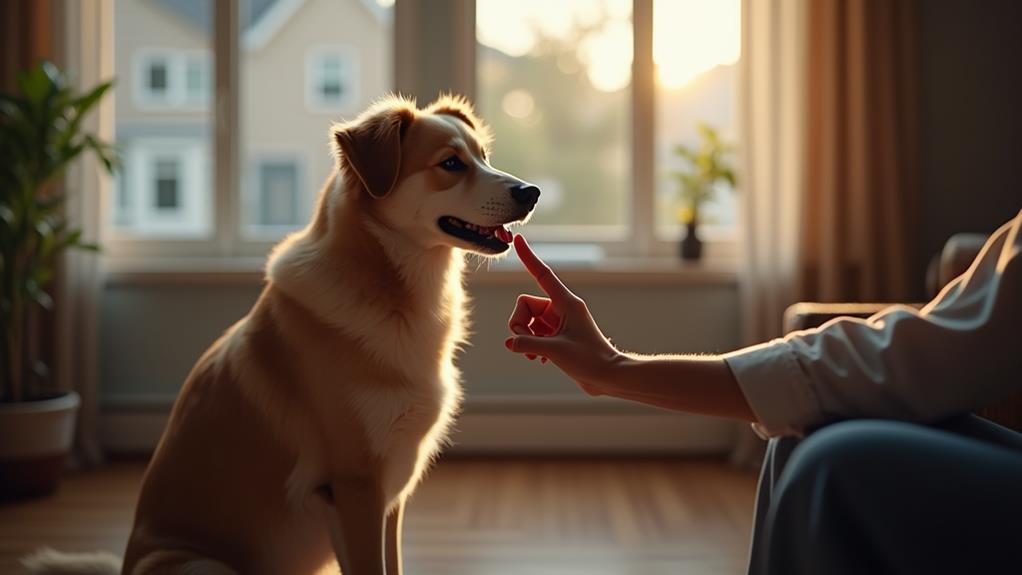To stop excessive dog barking, ensure your dog gets plenty of exercise through regular walks, runs, or playtime. Socialization is critical, so expose your pup to various people and pets to reduce anxiety-related barking.
Provide engaging toys and puzzles to keep their minds occupied when you're away. Minimize visual triggers and offer a cozy retreat to create a calm environment.
Train your dog to respond to the “quiet” command, consistently rewarding silence. Remember, addressing the root cause of barking, whether boredom, fear, or attention-seeking behavior, is essential. With patience and the right approach, you'll be on your way to a more peaceful home.
Points To Consider
- Exercise your dog regularly to release energy and reduce boredom-induced barking.
- Socialize your dog with people and pets to minimize anxiety-related barking.
- Provide engaging toys and puzzles to keep your dog mentally stimulated and less prone to bark.
- Create a calm environment by minimizing triggers and providing a comfortable space for your dog.
- Train the “quiet” command and consistently reinforce the desired behavior to manage excessive barking.
Exercise Your Dog Regularly

Release your dog's energy through regular exercise to curb excessive barking. By providing your canine companion with consistent physical activity, you'll tire them out, making them more likely to rest peacefully when you're away. This simple strategy can significantly reduce problem barking and create a calmer home environment.
Incorporate outdoor adventures into your routine to combat boredom, a common trigger for excessive barking. Take your dog on daily walks, runs, or hikes to provide a constructive outlet for their energy.
Consider exploring dog sports like agility or flyball to mentally and physically challenge your pet.
If your schedule is hectic, don't hesitate to hire a dog walker for mid-day exercise. This guarantees your dog receives necessary activity even when you're busy.
During colder months, an indoor dog treadmill can be an excellent alternative to maintain your pet's exercise routine.
Socialize With People and Pets
While exercise addresses your dog's physical needs, socializing tackles their emotional well-being. Exposing your companion to various people and pets can significantly reduce barking tendencies. Creating positive experiences with diverse individuals, including mail carriers and delivery personnel, will help diminish your dog's fear and anxiety in new situations.
Start socializing your puppy early to prevent excessive barking habits as it ages. Regularly introduce your dog to different environments and situations to build its confidence in social settings. This approach minimizes fear-based barking and helps your dog become more adaptable.
Consider these socialization strategies:
| Strategy | Benefits |
|---|---|
| Neighborhood walks | Exposure to various sights, sounds, and smells |
| Playdates | Interaction with other dogs in controlled settings |
| Group training classes | Structured socialization with people and pets |
Provide Engaging Toys and Puzzles

How can you keep your dog's mind occupied and reduce excessive barking? The answer lies in providing engaging toys and puzzles that offer cognitive stimulation.
Interactive toys, especially those that dispense treats, can significantly decrease barking by keeping your canine companion mentally engaged and focused.
Puzzle toys that challenge your dog's problem-solving skills entertain and stimulate cognitive function, helping to alleviate boredom-related barking.
Regularly rotating various toys will prevent your pet from losing interest and encourage continued play, effectively distracting them from potential barking triggers.
To maximize the benefits of engaging toys and puzzles:
- Choose interactive toys that dispense treats or require problem-solving
- Rotate toys frequently to maintain novelty and interest
- Use puzzles during times when you're away to minimize anxiety-induced barking
Studies show that dogs with access to mentally stimulating toys exhibit calmer behavior and lower stress levels, reducing excessive barking.
Create a Calming Environment
Your dog's environment plays an essential role in managing excessive barking. To create a calming atmosphere, start by introducing soothing sounds. Turn on a radio or TV at a low volume to provide familiar background noise to help your beloved companion feel more at ease when left alone.
Next, minimize visual triggers that might provoke barking—close blinds or curtains to reduce outside distractions, creating a more serene space for your dog.
Maintain a tidy and organized area to limit potential sources of anxiety and promote a sense of calm.
Establish a cozy retreat for your pet by providing comfortable bedding and favorite toys. This secure space will help your dog feel safe and relaxed, reducing the likelihood of stress-induced barking.
Train the Quiet Command

Training your dog to respond to the “quiet” command is essential in managing excessive barking. To teach this command effectively, wait for a moment of silence from your dog, then use a calm but firm voice to say “quiet” while immediately rewarding them with treats. Consistency is vital, so practice this command to reinforce the behavior in various situations.
When implementing the “quiet” command, remember these key points:
- Timing rewards: Offer treats immediately after your dog stops barking to create a clear connection between the command and their behavior.
- Avoid reinforcing barking: Don't respond to your dog when they bark, as this can inadvertently encourage the behavior.
- Distraction training: Gradually increase the level of distraction during training sessions to help your dog remain quiet in stimulating environments.
Pair the “quiet” command with positive reinforcement to strengthen the association between the desired behavior and rewards.
As you progress, practice in different settings to help your dog understand when to be quiet. By consistently applying these techniques, you'll help your canine companion develop better control over their barking habits, creating a more peaceful environment for both of you.
Frequently Asked Questions
How Do I Stop My Dog From Obsessively Barking?
Identify your dog's barking triggers and address them through consistent training techniques. Use positive reinforcement to reward quiet behavior. Provide mental stimulation and exercise to reduce boredom-related barking. Stay patient and persistent in your approach.
How Do You Discipline a Dog to Stop Barking?
You shouldn't “discipline” a dog to stop barking. Instead, use positive reinforcement and behavior modification techniques. Reward quiet behavior, ignore barking, and provide mental stimulation. Consistency and patience are crucial to changing your dog's vocalization habits.
Why Does My Dog Bark So Much for No Reason?
Your dog's “no reason” barking likely has triggers you're missing. Dogs use barking as communication signals. Observe closely to identify what's prompting the behavior. Once you understand the cause, you can address it effectively.
Can I Squirt My Dog With Water to Stop Barking?
While you can use a water spray for bark training, it's not recommended. It's a temporary fix that doesn't address underlying issues. Instead, focus on positive reinforcement and redirection techniques to effectively manage your dog's barking behavior in the long term.
The Article: Stop Excessive Dog Barking Was Found On https://happypetsgroomingtable.com/
The Article Stop Excessive Dog Barking First Appeared ON
: https://ad4sc.com





Comments are closed